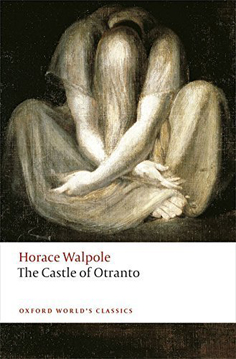This is a ridiculously bad book. The only thing that has redeemed it enough to justify any stars at all is that every time I've tried to describe the plot to anyone, I start giggling at just how over-the-top bad it is. Any book that starts with a groom being crushed by a monstrously large marble helmet on his wedding day has already signalled that it's not going in for subtle plot elements. And spoiler alert – I don't think poor Conrad's death is ever adequately explained. We finally find out the full details of the prophecy from the helmet's owner, but the prophecy is not meant to kick in until after Manfred has no male heir. I don't think it's playing fair for the vengeful ghost to take direct action by getting rid of the male heir to kick-start the prophecy!
I bought this book ages ago and tried to read it but I got bogged down in the introduction, found other, more interesting books to read, and put it aside. Recently, I read a history of the British fascination with murder stories, and that book talked a bit about the role Gothic horror contributed, in part, to the development of early mysteries. So, I thought I'd give this one another go. This time I ignored the introduction and just went straight into the book.
I haven't read many Gothic novels. I've read a few books that I think fit the genre, such as Frankenstein, Dracula and The Fall of the House of Usher. But all of these are really good stories, so they in no way prepared me for this book. I've also read Northanger Abbey, so I was a little prepared for the ridiculousness of the story, but even that satire failed to go to the extremes that this book does. I'm very much tempted to read Austen again, now, to see if I enjoy the jokes more, now that I've read this one.
The Castle of Otranto has every Gothic trope I can think of – damsels in distress (yes, several), a villainous prince, an ineffective priest, a mysterious hero, an old castle, hidden passages, ghosts, arranged marriages, death in childbirth and a prophecy. After Conrad's sudden death, his father, Manfred, decides that the best way for him to get a new heir is to tell his wife that they are divorced and then marry the fair Isabella, himself. Isabella wasn't even that keen to marry Conrad, to start with, and is understandably not too happy at the idea of getting Manfred as a husband, instead. She flees the castle via a hidden passage in the dungeon, setting off a ludicrous series of events with plot twists galore, until all gets resolved.
Would I recommend it? Maybe. I wouldn’t recommend it to someone just looking for a good book to read, but I would to someone who loved horror and was interested in the development of the genre. And I would encourage them with phrases like its mercifully short
and it's hilariously bad
.

 RSS Feed
RSS Feed Facebook
Facebook Instagram
Instagram YouTube
YouTube Subscribe to our Newsletter
Subscribe to our Newsletter



No one has commented yet. Be the first!